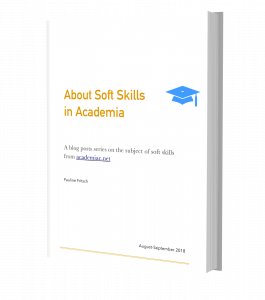This is the second article from a series about soft skills, click here to see the first article about What are soft skills for academics?
You know that feeling when you thought you had x number of one thing and when you actually take the time to count them, you realize that you have much more? Like when you count how much is worth all the cents/coins that you’ve accumulated in this jar since like forever?
Well, it’s the same with soft skills. You have more than you think, and you can prove it.
After I attended a workshop about identifying soft skills, I walked back to the train station together with the teacher. I was telling her that the workshop had made me realize of all the soft skills I was missing. Somehow in the discussion I mentioned that to help new PhD students in my lab I had created a file with some useful links. She said “see, this is mentoring!”. I was like “really? but that’s nothing, it’s just a few links…”. Still, it was a little something. And if I had already done a little something without even being aware of it, probably I could do some more little something in that direction. Suddenly developing new skills felt much easier than I originally thought 🙂
Not only we need to become self-aware of our skills, we also need to keep track of them. Why? Because we forget very fast.
During the first year of her PhD, one of my friends was interviewed by the local radio about the research in our lab. This was a unique science communication experience for her, she took precious time to prepare it and she really enjoyed the experience. 4 years later as she prepared her CV for postdoc applications, she completely forgot to put in this radio interview experience. It is her husband who reminded her while overlooking at her CV and she just could not believe she had forgotten it!
So now, how to identify your soft skills and how to keep track of them? Best finding a training workshop or a coach to guide you, but if you can’t or if you want more reading, here some references:
- At the workshop I attended we used the Joint Skills Statement by the UK Research Council (2001)
- You could also have a look at the more recent (2010) Researcher Development Statement by the Vitae programme (UK)
- There is also the nice online self-assessment tools from Science: myIDP = individual development plan
- Update 09/2019: check out all my #career blog posts especially the first one about: Skills, interests & values Self-Assessment Tools for PhDs
Then to keep track of your skills, you can take the list from the Joint Skills Statement (for example), and, for each skill, try to describe in which situation you used and developed it. You actually want to write a little story about what the situation was, what you did and what the result was. This will be your portfolio. Here a great article explaining how to do it: Transferable skills and storytelling.
I am writing this but, like my friend, I also completely forgot to keep my portfolio updated after the workshop 4 years ago. When I look at it now, I surprise myself again with some of the stuff I did, like resolving a big argument between two colleagues (= conflict management skill), and that was just in my first year… You know what? As I am writing this, I am creating a reminder in my calendar to update my portfolio every 3 months from now on. Done, no more excuse for me!
You can see your portfolio as a list of arguments to pick from for when it will be time to apply for your next position, and, like me, you can also see it as a private diary of all the cool and less cool shitty stuff that happened to you in academia and how it made you grow personally and professionally. When you’ll look back at your portfolio you can tell yourself, “yes, I haven’t finished this thing, but still I did this and this and this and there was that crazy time when … and wow, I’ve learned a lot”.
“Even a 1-day short course can considerably enhance the capacity of postgraduates and postdocs to recognize what soft skills they have, to be proud of them, to deploy them routinely, and to articulate them to potential employers.”
The next article of this series is How to know which soft skills training is best for my career?
I’ve put together the 6 articles of this soft skills in academia series in one PDF for you to read easily the whole series, you can subscribe here to get it!





0 Comments